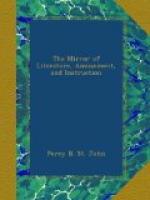The pastille produced its effect; the poet felt a sudden inspiration, left the hall and flew to compose the projected satire. He was surprised at his own aptitude; the verses cost him no trouble, but flowed of themselves. The bitterest expressions escaped from his pen without his seeking for them. In short, in an instant, he brought forth a true chef-d’oeuvre of malice.
He continued some moments in ecstacy with his work, and carried it in triumph to his friends—or rather to his accomplices. The satire was received with the liveliest applause: it was the pure and vigorous style of Osmyn. The writer had imitated his handwriting; and soon the libel was spread about in his name.
Murmurs arose on all sides against the ingratitude of Osmyn. The satire fell into the hands of the Caliph, who in his rage ordered the unfortunate Osmyn to be stript of all his property, and driven from Bagdad. Osmyn, overpowered by the blow, could not defend himself; besides, how could he make his innocence heard amidst the cries of his calumniators.
After having wandered a long time, every where imploring pity—sometimes meeting with kindness, but oftener repulsed with selfishness—he arrived, at nightfall, before a superb country house, magnificently illuminated. He heard the accents of joy mingled with the sounds of a brilliant concert of music, and saw all the signs of a splendid fete. However, the thunder began to roll, the sky was obscured by heavy clouds, and Osmyn’s miserable clothing was soon drenched by the rain.
He approached this beautiful house, in hopes to find there, if not hospitality for the night, at least an asylum for some minutes. The slaves perceived him, and said to him harshly—“What do you ask, beggar?”
“A humble shelter from the storm, a morsel of bread to appease my hunger, and a little straw to rest my body on, borne down by fatigue.”
“Thou shalt have none of these.”
“For pity—”
“Begone!”
“See how it rains!—Hear how it thunders!”
“Go elsewhere, and come not to disturb by thy presence the pleasures of our master.”
Osmyn was on the point of obeying this order, when the master of the house, who had witnessed this scene from a window, came down, called his slaves, and ordered them to receive the unfortunate man, to procure him clothes, a bed, and all he was in need of. “Misery,” said he, “misery is for him who revels in the presence of the poor, and suffers them to plead for assistance in vain; and misfortune for the rich who, cloyed with luxuries, refuse a morsel of bread to a famishing stranger. Poor traveller, go and repose thyself, and may the Prophet send thee refreshing slumbers, that thou mayst for a time forget thy sufferings.”
“Oh Heaven!” cried Osmyn, “what voice strikes my ear? It is the voice—the voice of Zambri!”
“Zambri! what! do you know him?”
“Heavens! do I know him?—Do I know my brother?”




